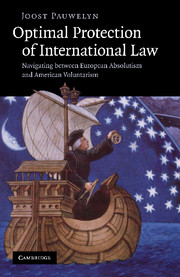 Optimal Protection of International Law
Optimal Protection of International Law Book contents
- Frontmatter
- Contents
- Table of cases
- Table of treaties
- Table of international documents
- Acknowledgments
- Abbreviations
- Foreword
- Introduction
- 1 Overview and relevance of the analysis
- 2 The two extremes of European absolutism and American voluntarism
- 3 Allocation, protection and back-up enforcement of entitlements
- 4 How should international law entitlements be protected?
- 5 How are international law entitlements currently protected?
- 6 Back-up enforcement in international law
- 7 Conclusion
- References
- Index
7 - Conclusion
Published online by Cambridge University Press: 07 July 2009
- Frontmatter
- Contents
- Table of cases
- Table of treaties
- Table of international documents
- Acknowledgments
- Abbreviations
- Foreword
- Introduction
- 1 Overview and relevance of the analysis
- 2 The two extremes of European absolutism and American voluntarism
- 3 Allocation, protection and back-up enforcement of entitlements
- 4 How should international law entitlements be protected?
- 5 How are international law entitlements currently protected?
- 6 Back-up enforcement in international law
- 7 Conclusion
- References
- Index
Summary
The insights offered in this book are largely good news for international law. Most commentators regard the lack of centralized law-making and enforcement as the core weakness or original sin of the international legal system. In contrast, one of the core conclusions reached in this book is that the starting point of no collective intervention may actually be one of international law's strongest selling points. It turns international law into the prototype “property regime.” In such a regime the default rule is that norms are made, and entitlements transferred, by consent, without collective intervention. For those who believe in individual choice and the free exchange of goods and entitlements as the best way to achieve overall welfare, this is good news. One of the biggest fights within states has been to reduce the influence and power of, first, religion and, later, central governments, over the life and choices of individuals. In international affairs, in contrast, the trajectory is quite the opposite: the starting point is freedom, self-determination and the rule that states can only be bound with their consent. From that vantage point, the quest and major difficulty in international law is rather to find centralized mechanisms to deal with collective problems. Whereas within states the challenge has been how to reduce collective intervention, at the inter-state level the challenge is how to increase collective intervention.
- Type
- Chapter
- Information
- Optimal Protection of International LawNavigating between European Absolutism and American Voluntarism, pp. 198 - 206Publisher: Cambridge University PressPrint publication year: 2008


